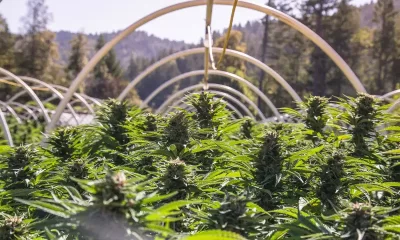Business
Black Market Cannabis Raids Uncover Victims of Human Trafficking in California

Law enforcement officials have noted an uptick in black market operators using human trafficking victims to grow and trim the cannabis sold in legal retail stores.
Authorities and advocates say that helping these victims isn’t always a simple task, as many don’t admit to being trafficked or may be unwilling to work with law enforcement to bring down the smugglers and dealers who put them in their positions.
Back in May, nine suspected victims were arrested in an early morning raid in California’s Mojave Desert. All of the workers on the secluded farm were Chinese nationals who traveled from New York, attempting to flee as law enforcement executed a search warrant.
NBC News reviewed the job listings, some of which didn’t mention specific salaries or noting that salary could be negotiated in person. One woman told the outlet via translator that she found the job on a Chinese website. Another worker named Jin said, “I have no money. What hope do I have?”
All of the workers also said they previously worked in the restaurant industry before heading West, and several mentioned their hopes to return to relatives on the East Coast. None of the workers had been paid for their labor and lived in cramped, uncomfortable trailers near the illegal grow operation.
One worker named Fang said she left her 8-year-old son behind in New York and described her living conditions, a trailer where she slept, as “very dirty, it’s very messy.” She also said that her employers had been dishonest about what the work would actually entail.
The workers were ultimately charged with misdemeanors and later released. They had tended to 25 greenhouses, where about 1,000 pound of processed cannabis was recovered, according to law enforcement. Officials also said that the facility likely generated $8 million in quarterly revenue. While none of the workers claimed they had been trafficked, law enforcement officials suspected otherwise.
Sergeant James Roy of the Riverside County Sheriff’s Department said it’s common for people who have been trafficked to tell officials they feel safe and avoid giving information on their traffickers due to fear of their own safety.
Attorney Xiaosheng Huang represents the trafficking victims and said his clients were exploited during the pandemic after losing their jobs in the hospitality industry, ultimately seeking employment anywhere they could find it.
Law enforcement officials in San Bernardino County have shut down nearly 1,100 illegal grow locations and more than 8,600 greenhouses in the last year, according to the sheriff’s department. Other investigations in Los Angeles and Riverside Counties pushed illegal cannabis seizures in the last year to more than $1 billion, according to a statement from the California Department of Cannabis Control.
In the statement, Director of the Department of Cannabis Control Nicole Elliot said, “This important milestone was reached through close collaboration with local, state, and federal partners and furthers California’s efforts to go after activities that harm communities and the environment, including water theft, threats of violence, elder abuse, and human trafficking to name a few.”
One of the reasons for California’s recreational cannabis program was to curb the black market sales and weaken the grip of drug cartels on the plant. Over the years, high taxes and costs of entry have created instability within the legal market, leaving room for illicit growers and dealers to swoop in with cheaper prices.
Earlier this year, Governor Gavin Newsom eliminated the cultivation tax on growers, though counties can still impose their own cultivation taxes. However, many cannabis professionals believe the move isn’t a long-term solution, doesn’t go far enough to elevate social equity measures, or plainly that the move came too late.
With market saturation and higher supply than demand, the profits cultivators can expect from a pound of wholesale flower have dropped from about $1,000 one year ago to $300 or lower today.
California has consistently been ahead of the action with its finger on the pulse of the cannabis market, as the first U.S. state to legalize medical cannabis with a number of regions heavily tied to cannabis culture. What exactly it will take to eliminate some of these continuous issues within the legal and black market industries remains to be seen.
Business
New Mexico cannabis operator fined, loses license for alleged BioTrack fraud

New Mexico regulators fined a cannabis operator nearly $300,000 and revoked its license after the company allegedly created fake reports in the state’s traceability software.
The New Mexico Cannabis Control Division (CCD) accused marijuana manufacturer and retailer Golden Roots of 11 violations, according to Albuquerque Business First.
Golden Roots operates the The Cannabis Revolution Dispensary.
The majority of the violations are related to the Albuquerque company’s improper use of BioTrack, which has been New Mexico’s track-and-trace vendor since 2015.
The CCD alleges Golden Roots reported marijuana production only two months after it had received its vertically integrated license, according to Albuquerque Business First.
Because cannabis takes longer than two months to be cultivated, the CCD was suspicious of the report.
After inspecting the company’s premises, the CCD alleged Golden Roots reported cultivation, transportation and sales in BioTrack but wasn’t able to provide officers who inspected the site evidence that the operator was cultivating cannabis.
In April, the CCD revoked Golden Roots’ license and issued a $10,000 fine, according to the news outlet.
The company requested a hearing, which the regulator scheduled for Sept. 1.
At the hearing, the CCD testified that the company’s dried-cannabis weights in BioTrack were suspicious because they didn’t seem to accurately reflect how much weight marijuana loses as it dries.
Company employees also poorly accounted for why they were making adjustments in the system of up to 24 pounds of cannabis, making comments such as “bad” or “mistake” in the software, Albuquerque Business First reported.
Golden Roots was fined $298,972.05 – the amount regulators allege the company made selling products that weren’t properly accounted for in BioTrack.
The CCD has been cracking down on cannabis operators accused of selling products procured from out-of-state or not grown legally:
- Regulators alleged in August that Albuquerque dispensary Sawmill Sweet Leaf sold out-of-state products and didn’t have a license for extraction.
- Paradise Exotics Distro lost its license in July after regulators alleged the company sold products made in California.
Golden Roots was the first alleged rulebreaker in New Mexico to be asked to pay a large fine.
Source: https://mjbizdaily.com/new-mexico-cannabis-operator-fined-loses-license-for-alleged-biotrack-fraud/
Business
Marijuana companies suing US attorney general in federal prohibition challenge

Four marijuana companies, including a multistate operator, have filed a lawsuit against U.S. Attorney General Merrick Garland in which they allege the federal MJ prohibition under the Controlled Substances Act is no longer constitutional.
According to the complaint, filed Thursday in U.S. District Court in Massachusetts, retailer Canna Provisions, Treevit delivery service CEO Gyasi Sellers, cultivator Wiseacre Farm and MSO Verano Holdings Corp. are all harmed by “the federal government’s unconstitutional ban on cultivating, manufacturing, distributing, or possessing intrastate marijuana.”
Verano is headquartered in Chicago but has operations in Massachusetts; the other three operators are based in Massachusetts.
The lawsuit seeks a ruling that the “Controlled Substances Act is unconstitutional as applied to the intrastate cultivation, manufacture, possession, and distribution of marijuana pursuant to state law.”
The companies want the case to go before the U.S. Supreme Court.
They hired prominent law firm Boies Schiller Flexner to represent them.
The New York-based firm’s principal is David Boies, whose former clients include Microsoft, former presidential candidate Al Gore and Elizabeth Holmes’ disgraced startup Theranos.
Similar challenges to the federal Controlled Substances Act (CSA) have failed.
One such challenge led to a landmark Supreme Court decision in 2005.
In Gonzalez vs. Raich, the highest court in the United States ruled in a 6-3 decision that the commerce clause of the U.S. Constitution gave Congress the power to outlaw marijuana federally, even though state laws allow the cultivation and sale of cannabis.
In the 18 years since that ruling, 23 states and the District of Columbia have legalized adult-use marijuana and the federal government has allowed a multibillion-dollar cannabis industry to thrive.
Since both Congress and the U.S. Department of Justice, currently headed by Garland, have declined to intervene in state-licensed marijuana markets, the key facts that led to the Supreme Court’s 2005 ruling “no longer apply,” Boies said in a statement Thursday.
“The Supreme Court has since made clear that the federal government lacks the authority to regulate purely intrastate commerce,” Boies said.
“Moreover, the facts on which those precedents are based are no longer true.”
Verano President Darren Weiss said in a statement the company is “prepared to bring this case all the way to the Supreme Court in order to align federal law with how Congress has acted for years.”
While the Biden administration’s push to reschedule marijuana would help solve marijuana operators’ federal tax woes, neither rescheduling nor modest Congressional reforms such as the SAFER Banking Act “solve the fundamental issue,” Weiss added.
“The application of the CSA to lawful state-run cannabis business is an unconstitutional overreach on state sovereignty that has led to decades of harm, failed businesses, lost jobs, and unsafe working conditions.”
Business
Alabama to make another attempt Dec. 1 to award medical cannabis licenses

Alabama regulators are targeting Dec. 1 to award the first batch of medical cannabis business licenses after the agency’s first two attempts were scrapped because of scoring errors and litigation.
The first licenses will be awarded to individual cultivators, delivery providers, processors, dispensaries and state testing labs, according to the Alabama Medical Cannabis Commission (AMCC).
Then, on Dec. 12, the AMCC will award licenses for vertically integrated operations, a designation set primarily for multistate operators.
Licenses are expected to be handed out 28 days after they have been awarded, so MMJ production could begin in early January, according to the Alabama Daily News.
That means MMJ products could be available for patients around early March, an AMCC spokesperson told the media outlet.
Regulators initially awarded 21 business licenses in June, only to void them after applicants alleged inconsistencies with how the applications were scored.
Then, in August, the state awarded 24 different licenses – 19 went to June recipients – only to reverse themselves again and scratch those licenses after spurned applicants filed lawsuits.
A state judge dismissed a lawsuit filed by Chicago-based MSO Verano Holdings Corp., but another lawsuit is pending.
Source: https://mjbizdaily.com/alabama-plans-to-award-medical-cannabis-licenses-dec-1/
-

 Business2 years ago
Business2 years agoPot Odor Does Not Justify Probable Cause for Vehicle Searches, Minnesota Court Affirms
-

 Business2 years ago
Business2 years agoNew Mexico cannabis operator fined, loses license for alleged BioTrack fraud
-

 Business2 years ago
Business2 years agoAlabama to make another attempt Dec. 1 to award medical cannabis licenses
-

 Business2 years ago
Business2 years agoWashington State Pays Out $9.4 Million in Refunds Relating to Drug Convictions
-

 Business2 years ago
Business2 years agoMarijuana companies suing US attorney general in federal prohibition challenge
-

 Business2 years ago
Business2 years agoLegal Marijuana Handed A Nothing Burger From NY State
-

 Business2 years ago
Business2 years agoCan Cannabis Help Seasonal Depression
-

 Blogs2 years ago
Blogs2 years agoCannabis Art Is Flourishing On Etsy













